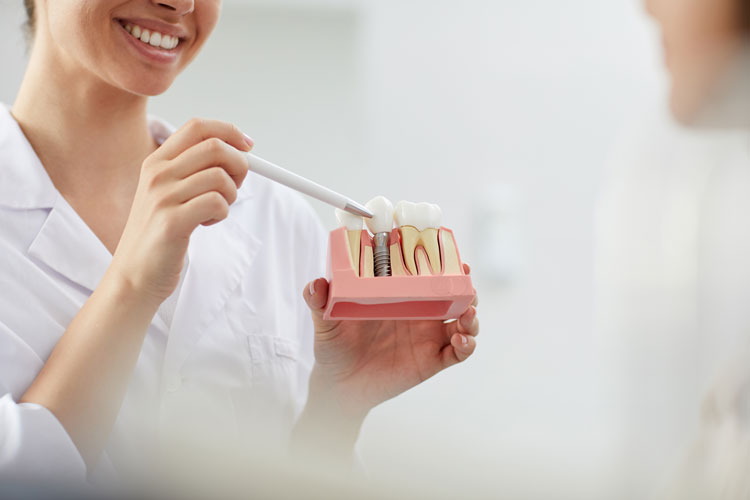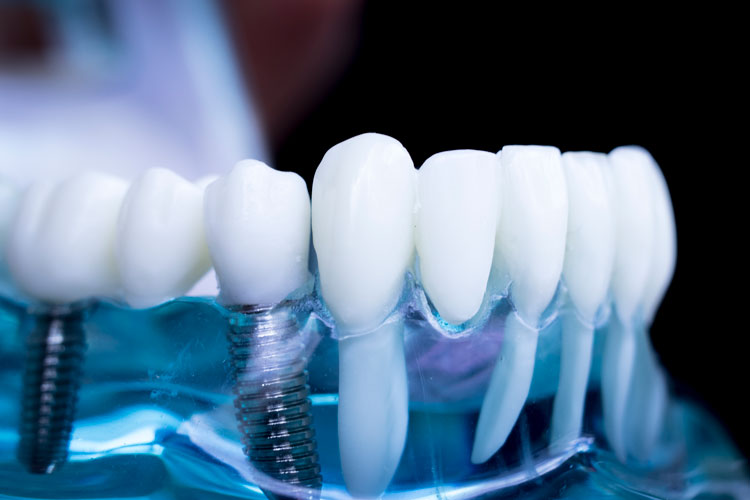How Much Do Dental Implants Cost and Recovery Process
To understand how much dental implants cost and how long they take to heal, let’s understand what they are first.

Dental implants are a permanent tooth replacement solution that has been used successfully since the 1960s. Designed to be artificial tooth roots, dental implants have a similar shape to screws and are bonded with the natural bone in the jaw to create a sturdy base to support artificial teeth. With an extensive lifespan and several health benefits, dental implants can be well worth the investment’s price.
A single top or bottom set can cost anywhere between $3,500 to $30,000. Full-mouth implants can range from $7,000 to $90,000, with the full-mouth set averaging approximately $30,000.
The average amount of time that it takes to recover from dental implant surgery is about 6 to 8 months; however, this can increase depending on any pre-existing conditions or special procedures that have to be completed before you get the surgery.
Dental implant surgery involves replacing tooth roots with synthetic materials such as screw-like posts or metals. Dental implants are no joke, and the entire procedure should be taken seriously to avoid any issues during the recovery process or the surgery.
Step-by-Step Dental Implant Procedure

1. Initial Consultation: The first step in the dental implant process is the initial assessment. During this appointment, the dentist conducts a comprehensive dental examination, which includes X-rays and sometimes 3D images to assess the health of your jawbone and the positioning of the implants. We discuss your medical history to ensure dental implants are suitable for you.
2. Treatment Planning: Based on the initial examination, the dentist develops a personalized treatment plan. This plan considers factors such as the number of teeth to be replaced and the condition of your jawbone. If additional procedures like bone grafting are needed, they are planned at this stage.
3. Preparatory Procedures: If the jawbone is not thick enough or is too soft, a bone graft might be necessary to create a more solid base for the implant. This involves taking bone from another part of your body or using a synthetic bone material. The grafting process must fully heal before the implant, which can take several months.
4. Implant Placement: Once your jawbone is prepared or deemed ready for the implant, the dental implant surgery occurs. This involves placing the titanium implant post into the missing tooth’s bone socket. This surgery is typically performed under local anesthesia. After the implant is placed, it needs to heal and integrate with the jawbone, a process called osseointegration. This can take several weeks to months.
5. Abutment Placement: After osseointegration is complete, a second minor surgery is performed to place the abutment, which will hold the artificial tooth. During this procedure, the gum is reopened to expose the implant, the abutment is attached, and the gum tissue is closed around but not over the abutment.
6. Artificial Tooth Placement: Once the gums heal around the abutment, impressions of your mouth and remaining teeth are taken to create the artificial tooth or crown. The crown is then attached to the abutment. Depending on the type of implant and the aesthetics needed, we may place a temporary crown while the custom crown is being made.
7. Aftercare and Follow-up: After the crown is placed, regular follow-up visits are scheduled to monitor the implant, teeth, and gums to ensure their health. Proper oral hygiene practices are critical to the success and longevity of the dental implant.
The Total Cost of Dental Implants is Based on Each Client’s Individual Needs

Since every dental implant treatment is customized for specific individuals’ needs, the costs vary accordingly. The total cost depends on several different factors, including how many teeth need replacing and where they’re located, the number and type of implants, and whether any additional procedures are necessary to prepare your mouth for the implants.
An evaluation by an experienced dental implant expert is the best way to ensure that you are getting an accurate cost estimate for quality work. If you see ads for dental implants with low prices that seem too good to be true – well, you know what they say. If someone quotes you a price for dental implants without examining you, it’s best to be cautious in that scenario.
Most insurance companies do not cover the full cost of dental implants, even though they are now considered the standard solution to tooth replacement.
The Cost of Alternative Solutions for Dental Implants
You might be surprised how affordable dental implants are compared to other tooth replacement options, especially when you take into account long-term cost-effectiveness and quality of life. At first glance, dentures or removable bridges can appear more inexpensive compared to the price of dental implants, given their lower upfront costs. However, the full cost of these options can run much higher than the cost of dental implants, for several reasons:
- Initial costs versus total costs. The initial price you pay doesn’t include the cost of replacing your dentures or bridges, which may be necessary as often as every 5 to 15 years. It also doesn’t include the ongoing maintenance costs, such as fixatives and adhesives.
- The convenience costs. Unlike your natural teeth or dental implants, you need to remove your dentures to soak and brush them, which can be a time-consuming hassle.
- The health costs. Without a tooth or implant, your jawbone will begin to deteriorate, which can change your facial appearance.
- The social costs. Dentures can slip or click when you chew, laugh, talk, or kiss. There is the possibility of them falling out altogether.
The Cost of Dental Implants can be Well Worth the Investment
When taking into mind all of the variables of the long-term effects, benefits, and quality of dental implants, it’s easy to see why they have become the standard solution in the world of replacing
teeth. The cost of dental implants may seem expensive when you first look into it but can be overall worth the investment and offer some peace of mind for your dental health.
How Long Do Dental Implants Really Take to Heal?

The average recovery time for a dental implant procedure is about 6 to 8 months; however it your recovery period can be longer depending on the initial issue that caused the need for dental implants and any unique additions that your surgery includes, like bone grafts.
The success rate of dental implant surgeries varies based upon the specific location in the jaw where the implants are placed. Typically, dental implant surgeries have about a 98% success rate for most patients. Your doctor will be able to give you more accurate information about the success rate of your procedure based on the personalized health data they have already collected. To further understand how long do dental implants take to heal, let’s break down the benefits.
Why Someone Might Need Dental Implants
Most people who get dental implants are forced to due to an extenuating condition such as oral injury, periodontal disease, and tooth decay. At their core, dental implants are replacement tooth roots that are made to resemble your natural teeth as closely as possible. They come in two variations: removable and permanent dental implants, the type the of implant you receive will depend on your specific oral condition.
If you’ve recently undergone a dental implant surgery or have one planned for the near future, you will want to continue reading this article to find useful tips and information to help you recover from your surgery much more comfortable.
How to Speed Up Your Dental Implant Recovery Process
As we stated before, the average recovery time for dental implants can take months. However, using the proper care techniques can reduce this time.
- Whether you smoke tobacco products or not
- Diabetic diagnosis
- The number of dental implants that you receive
- Whether you follow all of your dentist’s personalized instructions
- Whether or not you have enough existing healthy bone mass for the implants to bind to
All of these factors will directly impact how long it takes for you to recover from dental implant surgery fully. During the healing process, make sure you avoid any hard or crunchy foods as they can ruin your implants leading to more issues down the road.
People Also Ask
How painful is dental implant surgery?
Most dental implant patients say the procedure is smooth, and a local anesthetic is used so that the discomfort is minimal. Plus, implants are popular because they give patients a natural, lasting smile, allowing them to live and eat without holding back.
How long does the dental implant surgery take?
The dental implant process is usually a three-phase process, which can be different for each person. Typically the entire process takes from 5 to 8 months but can differ on each case and what each patient needs.
How long does it take for dental implants to settle?
Dental Implant takes about an average of six to eight months for dental implants to fully heal to the point where you can resume your daily routine without assistance. However, it can take longer, all depending on what was involved with your dental implant surgery such as bone grafts, etc.
How can I make my dental implant heal faster?
There are many ways that you can speed up your dental implants’ recovery process. Some of the most effective methods include: only eating soft foods, taking medication, limiting your physical activity, and getting adequate rest.
What are the negative effects of dental implants?
There are several risks associated with dental implant surgery, including nerve damage, infection at the implant site, sinus issues, and more.
Contact Dr. Dalesandro’s Office Today For More Information

Understanding the cost and recovery process associated with dental implants is crucial for anyone considering this permanent solution for tooth loss. While the initial investment may seem substantial, the long-term benefits of dental implants—such as improved oral health, enhanced comfort, and a natural appearance—justify the cost for many. Remember, each patient’s journey is unique, and the total cost and recovery time can vary based on individual needs and treatment plans.
Contact our office today to schedule your consultation. Our team is dedicated to providing detailed information and personalized care tailored to your oral health needs. Let us help you take the first step towards a brighter, more confident smile. Call us at 520-327-5993 or visit our website to book your appointment. Rediscover the joy of a healthy, full smile with us!
